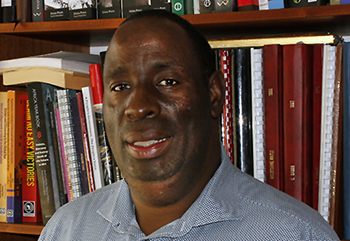Latest News Archive
Please select Category, Year, and then Month to display items
02 January 2025
|
Story Gerda-Marie van Rooyen
|
Photo Supplied
 Leading the research in South Africa is Prof Linus Franke from the Department of Soil, Crop and Climate Sciences.
Leading the research in South Africa is Prof Linus Franke from the Department of Soil, Crop and Climate Sciences.
Scientists are actively pursuing the successful breeding of diploid hybrid potatoes from inbred lines. This is expected to revolutionise potato breeding as it holds the key to rapid genetic progress. It will introduce new varieties for commercialisation through seed. Currently, existing potato variants have a gene that renders self-pollinated seeds infertile.
Prof Linus Franke, an academic in the Department of Soil, Crop and Climate Sciences at the UFS, is leading the research in South Africa. “This technology allows the production of genetically uniform potato seed that is easy to transport and largely disease-free.” He says this differs from conventional breeding whereby only vegetative propagation is possible due to tetraploid varieties in potatoes. It also risks carrying pests and diseases from one generation to the next – leading to the accumulation of pests and diseases with each round of multiplication.
Seed innovation
Prof Franke explains that Solynta BV, a seed company based in the Netherlands that produces potato varieties that can be grown from seed, has included South Africa in their research efforts because it is one of Africa’s largest producers and exporters. Through his academic relationship with Wageningen University and Research, a Dutch institution renowned for its agricultural endeavours and food production, the UFS became involved in researching hybrid potatoes grown from seed.
Diploid seeds containing two sets of chromosomes allow easier gene manipulation to increase predictability and speedier genetic progress. The breeding approach enables the incorporation of tolerance to pests, diseases, abiotic stresses (cold, heat, drought) and other desired genetic traits.
Although Prof Franke is optimistic about this research, he is not blind to disadvantages. “Potato seeds are tiny and have little energy reserves, making it harder to grow potatoes from seed than from tubers.” He says potatoes from seed will take longer to cultivate than tubers, as farmers need to grow plantlets from seeds first, adding six weeks to the growing period. “It is possible that commercial farmers can grow potatoes directly from seed. Alternatively, perhaps more likely, specialised growers will produce tubers of potatoes from seed; these tubers are then sold as seed tubers to other potato farmers, who then continue their normal practices of producing potatoes for the market from tubers.”
Financial benefits
Prof Franke says farmers have reason to get excited. “Seed potatoes will reduce input costs, as varieties with enhanced tolerance to pests and diseases require less pesticides. Planting one hectare of potatoes requires three to four tonnes of potato tubers, but only one 25 g packet of potato seeds.” Since potatoes are a more valuable commodity than maize, this technology might also increase farmers’ income potential.
UFS History lecturer becomes Visiting Fellow at Harvard
2015-05-25

Dr Chitja Twala
Photo: Eugene Seegers |
Prestige Scholar and lecturer of African/South African History at the UFS, Dr Chitja Twala, was recently accepted as a Visiting Fellow at the Harvard Graduate School of Arts and Sciences (GSAS).
A Visiting Fellow status is available to individuals holding a doctoral degree to pursue independent research at Harvard. The Fellowship is for non-degree purposes but aims at the enhancement and further intellectual development of those involved. It focuses on enrichment and development programmes.
Twala was appointed in the Department of History at the UFS in the beginning of 2003. His research field is Liberation History, with specific reference to the liberation movements on the SADC region. He has published extensively on this field and presented papers in local and international conferences.
“I applied (to Harvard GSAS) in April 2014 for the Fellowship through the South Africa Harvard Fellowship Programme,” says Twala.
“After being successful in the interviews conducted by the GSAS panel in July 2014, I had to apply for admission in the Department of African and African American Studies at Harvard, and got accepted for the Fall Semester of 2015.”
At Harvard, Twala will be mentored by Prof Emmanuel Akyeampong (African History Expert).
“Firstly, my main assignment will be to grasp a much deeper theoretical knowledge/framework in historical studies and a broader repertoire of methodologies in the field of African History. Secondly, if time permits, I will be presenting seminars and attending some in a very challenging, stimulating, and intellectually demanding environment where my ideas can be tested and expanded. Thirdly, I will be exposed to new trends as far as African historiography is concerned. Lastly, I will informally engage and exchange some ideas with some experts in the field of African History.”
The programme was recommended to Twala by the Vice-Chancellor and Rector, Prof Jonathan Jansen and Prof Ian Phimister, Centre for Africa Studies Senior Professor at UFS.
“As per the priorities of the Prestige Scholarship Programme, the Fellowship will assist in inculcating in me the intellectual breadth and depth required to pose critical questions and generate ground-breaking knowledge for History as a discipline. It is important for the UFS to establish and sustain international networks with other leading universities and scholars around the world.
“I applied for this Fellowship in order to advance further and broaden the scope in the three areas of scholarship in higher education: discovery, teaching, and public engagement,” says Twala.
Twala will be leaving for Harvard by mid-August and will return by the end of December 2015.